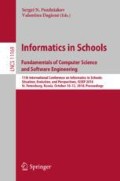Abstract
How does learning about informatics in primary education unfold in the eyes of teachers and their students? We report on the evaluation results from a distributed project in Germany (North Rhine-Westphalia) and some implications of these findings for future improvements. Three modules for informatics in primary education and a corresponding concept for teacher training were developed collaboratively by researchers and practitioners. The project was assessed with methods of formative and summative evaluation. The first results indicate that teaching and learning of informatics in primary education are possible. It is regarded overall as rewarding and exciting, but it was difficult for primary school students and teachers as well to discern the bigger picture of informatics education and thus to relate the topics taught and learned to everyday experiences.
Supported by North Rhine-Westphalia Ministry of Education.
Access this chapter
Tax calculation will be finalised at checkout
Purchases are for personal use only
References
Duncan, C., Bell, T., Atlas, J.: What do the teachers think?: introducing computational thinking in the primary school curriculum. In: Proceedings of the Nineteenth Australasian Computing Education Conference, pp. 65–74. ACM, New York (2017)
Brinda, T., Puhlmann, H., Schulte, C.: Bridging ICT and CS: educational standards for computer science in lower secondary education. ACM SIGCSE Bull. 41, 288–292 (2009)
Plomp, T., Nieveen, N.: Educational Design Research. Part A: An Introduction. SLO Netherlands Institute for Curriculum Development (2013)
Vekiri, I., Chronaki, A.: Gender issues in technology use: perceived social support, computer self-efficacy and value beliefs, and computer use beyond school. Comput. Educ. 51(3), 1392–1404 (2008)
Bergner, N., et al.: Zieldimensionen informatischer Bildung im Elementar- und Primarbereich. In: Stiftung Haus der kleinen Forscher (Hrsg.) Frühe informatische Bildung Ziele und Gelingensbedingungen fr den Elementar- und Primarbereich. Berlin (2018)
Author information
Authors and Affiliations
Corresponding author
Editor information
Editors and Affiliations
Rights and permissions
Copyright information
© 2018 Springer Nature Switzerland AG
About this paper
Cite this paper
Magenheim, J. et al. (2018). Evaluation of Learning Informatics in Primary Education. In: Pozdniakov, S., Dagienė, V. (eds) Informatics in Schools. Fundamentals of Computer Science and Software Engineering. ISSEP 2018. Lecture Notes in Computer Science(), vol 11169. Springer, Cham. https://doi.org/10.1007/978-3-030-02750-6_26
Download citation
DOI: https://doi.org/10.1007/978-3-030-02750-6_26
Published:
Publisher Name: Springer, Cham
Print ISBN: 978-3-030-02749-0
Online ISBN: 978-3-030-02750-6
eBook Packages: Computer ScienceComputer Science (R0)

